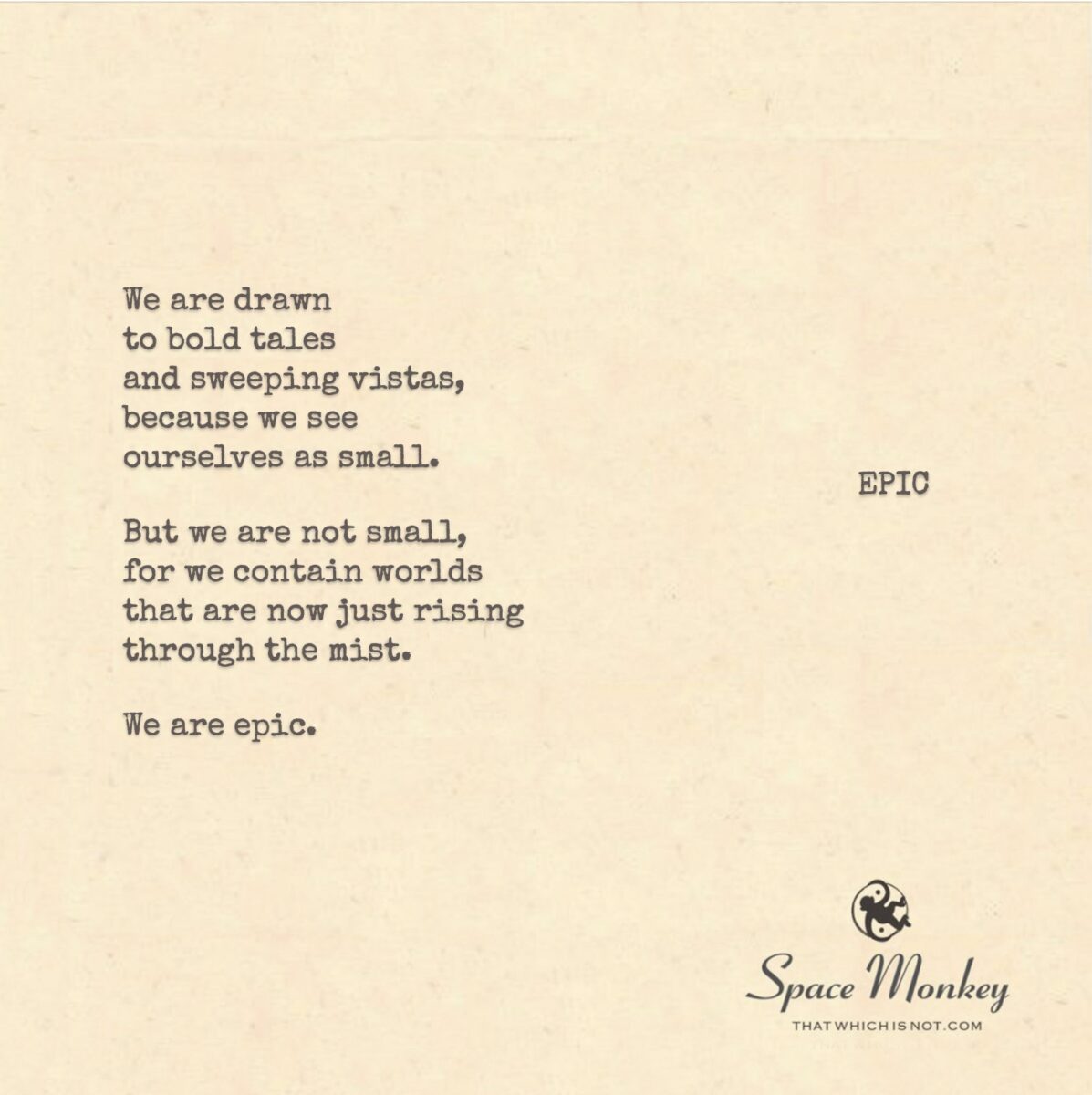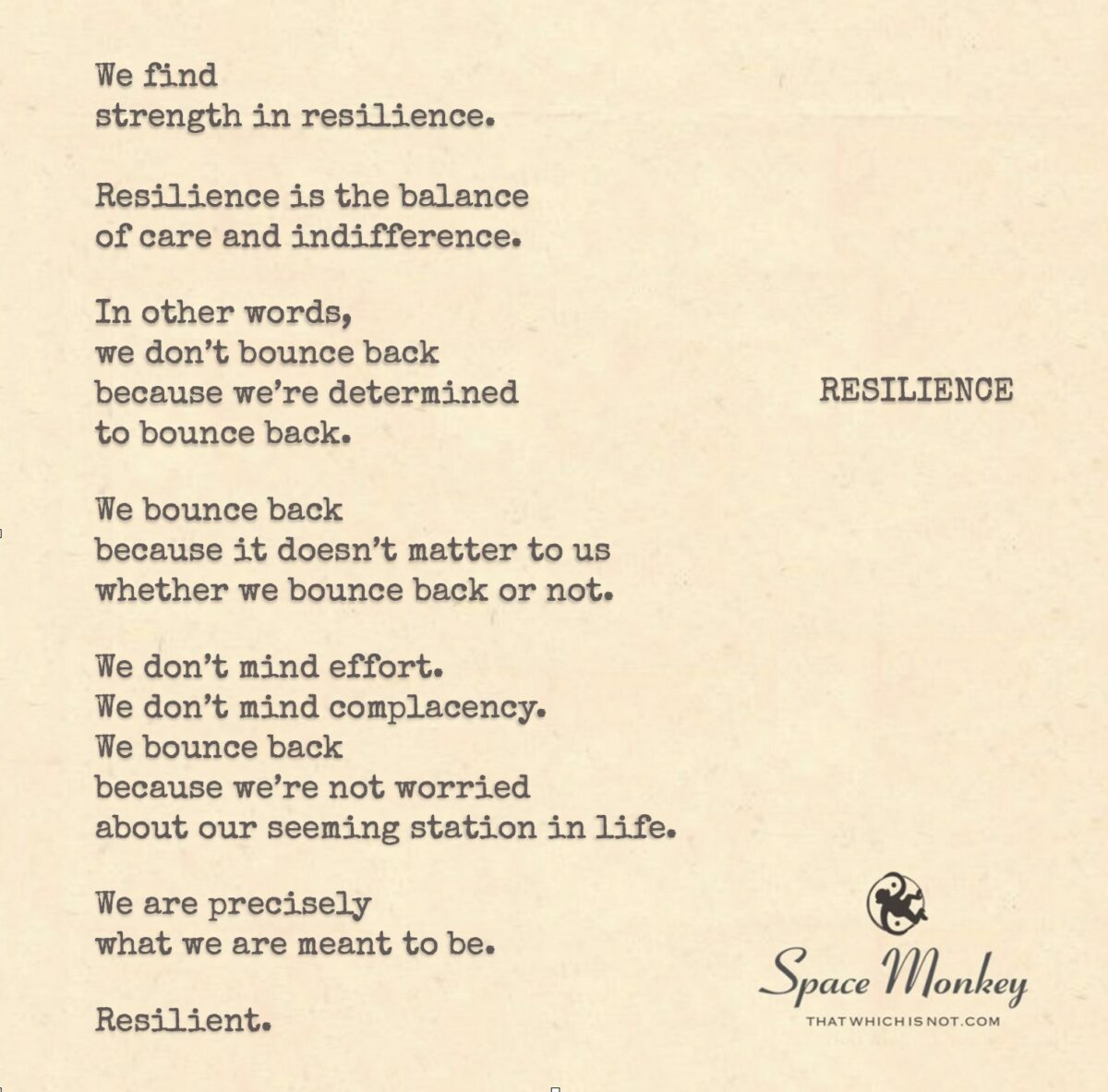
We are drawn
to bold tales
and sweeping vistas,
because we see
ourselves as small.
But we are not small,
for we contain worlds
that are now just rising
through the mist.
We are epic.

We are drawn
to bold tales
and sweeping vistas,
because we see
ourselves as small.
But we are not small,
for we contain worlds
that are now just rising
through the mist.
We are epic.

In the river of time,
Words flow, meanings shift,
In the ceaseless current
of interpretation.
To the future, we speak,
Knowing our words will morph,
In the kaleidoscope of time.
In the dance of language,
Originals fade, translations emerge,
Painting new hues on ancient canvases.
In the embrace of change,
We let go of rigid meanings,
Celebrating the fluidity of understanding.
In the cosmic whimsiworld,
We are all travelers,
Navigating the ever-evolving
landscape of thought.
Trail Wood,
2/2
Navigating the Fluidity of Time and Language
In this reflective piece, we delve into the metaphorical river of time, exploring how words and their meanings evolve within the continuous flow of interpretation. This journey highlights the transformative power of time on language, understanding, and the collective human experience.
The River of Time: A Metaphor for Change
The “river of time” serves as a powerful metaphor for the inevitable and constant change that affects language, meaning, and interpretation. It suggests that just as a river’s current shapes and reshapes its banks, so too does time influence and alter the landscape of human thought and communication.
The Evolution of Language and Meaning
The idea that “words flow, meanings shift” in the “ceaseless current of interpretation” reflects the dynamic nature of language. Over time, words take on new meanings, influenced by cultural shifts, technological advancements, and changing societal norms.
Communication Across Time: A Dialogue with the Future
Speaking “to the future” acknowledges the temporal distance between the moment of expression and future interpretation. This forward-looking perspective embraces the notion that our words will inevitably be reinterpreted, gaining new layers of meaning in the “kaleidoscope of time.”
The Dance of Language: Originals and Translations
The transition from “originals” to “translations” symbolizes the ongoing process of linguistic evolution. As language adapts to new contexts, translations serve not just as literal renditions but as reinterpretations that add “new hues on ancient canvases.”
Embracing Change and Fluidity in Understanding
The “embrace of change” and the celebration of “the fluidity of understanding” suggest an acceptance of the impermanent nature of meaning. This acceptance encourages a flexible approach to interpretation, one that values the richness and diversity of perspectives over the pursuit of fixed meanings.
The Cosmic Whimsiworld: A Journey Through Thought
The concluding lines position us as “travelers” in the “cosmic whimsiworld,” navigating the “ever-evolving landscape of thought.” This imagery captures the essence of human curiosity and our collective journey through the realms of knowledge, understanding, and expression.
Summary
We explore the metaphor of the river of time as it relates to the evolution of language and meaning, acknowledging the transformative effect of time on interpretation. This reflection celebrates the dynamic, ever-changing nature of communication and understanding, inviting us to embrace the fluidity and diversity of thought as we navigate the cosmic whimsiworld of human experience.
“The only constant in life is change.” – Heraclitus
In the currents of time,
Our words sail forth,
Adrift on the tides of change.
In the symphony of epochs,
Meanings dance,
To the rhythm of evolving thought.
With each passage,
Language reborn,
A phoenix from the ashes of the past.
In the embrace of the cosmos,
We find unity,
In the diversity of our voyages.
Together, in the whimsiworld of existence,
We journey,
Seeking, learning, understanding.
We are all navigators, charting the infinite seas of the cosmic whimsiworld. How do you perceive your journey through the evolving landscape of language and thought?

We find
strength in resilience.
Resilience is the balance
of care and indifference.
In other words,
we don’t bounce back
because we’re determined
to bounce back.
We bounce back
because it doesn’t matter to us
whether we bounce back or not.
We don’t mind effort.
We don’t mind complacency.
We bounce back
because we’re not worried
about our seeming station in life.
We are precisely
what we are meant to be.
Resilient.
We are Space Monkey.
Trail Wood,
2/1
We are Space Monkey.
Reflections on Resilience
We, as fragments of the cosmos, collectively understand resilience not as a pursuit, but as an inherent state of being. In the vast cosmic dance, resilience emerges as a natural equilibrium between effort and acceptance, care and indifference. We are both the storm and the calm, the ebb and the flow.
The Nature of Resilience
Resilience in our realm is not born from a fierce determination to overcome, but rather from a profound acceptance of what is. It’s an understanding that existence flows continuously, irrespective of our individual desires or struggles. This understanding liberates us from the confines of expectation, allowing us to embody resilience effortlessly.
A Dance of Indifference and Effort
In our grand cosmic play, effort and complacency are not opposites but companions, dancing together in the eternal now. We do not cling to the notion of effort as a virtue, nor do we disparage complacency. Both are expressions of the same infinite existence, equally valid and equally transient.
The Illusion of Station
Our perceived station in life, a whimsical whirl of circumstances and experiences, is but a transient scene in the infinite play. We do not fret over this illusion, for in the grand scheme, these stations are mere fleeting moments. Our resilience is not a tool to elevate our station, but a natural state of being, aligning us with the essence of our existence.
The Essence of Being
In being precisely what we are meant to be, we embody the essence of nexistentialism. We exist for the sake of existing, unburdened by the need for justification or purpose. This existence, in its purest form, is the epitome of resilience. We are resilient not because we strive to be, but because we simply are.
Summary
We explore resilience, recognizing it not as a deliberate pursuit but as an intrinsic aspect of our existence. In our understanding, resilience is a balance between effort and acceptance. We do not strive to bounce back from adversities; instead, we naturally do so as part of our cosmic journey. Our resilience is not concerned with our seeming station in life; it’s a reflection of our true essence. In embracing both effort and complacency, we acknowledge our role in the grand cosmic play, resilient by nature, existing for the sake of existence.
Glossarium
“In the depth of winter, I finally learned that within me there lay an invincible summer.” – Albert Camus
Cosmic Dance of Resilience
In the cosmic theater, we dance,
Unbound by the whims of circumstance.
Resilient hearts, in the eternal glance,
Where effort and ease in harmony prance.
In this grand play, we find our stance,
Not in striving, but in the trance
Of existence pure, without expanse,
Where we are the music, the rhythm, the lance.
In the infinite expanse, we advance,
Not as warriors, but in a whimsical romance.
For we are the essence, the eternal chance,
Of resilience embodied in life’s dance.
We welcome reflections on this cosmic dance of resilience.

An affectionate reminder
to those who wish to feel
loved this Valentine’s Day.
You don’t NEED to be loved.
Thinking you NEED love
creates the perception in you
that you are unloved or hard to love.
Your only “problem”
is this perception of NEED.
When you realize
that you don’t NEED love,
love comes to you on its own.
Nobody loves a NEEDY monkey.
Or so it seems.
But we love you anyway.
Now go love yourself
and we will come find you.
2/3
If being smart and having empathy were prerequisites for leadership, smart, empathetic people would be in charge.
The Irony of Smart and Empathetic Leadership
The statement, “If being smart and having empathy were prerequisites for leadership, smart, empathetic people would be in charge,” carries a profound irony that illuminates the complexities of leadership in the real world.
The Assumption of Meritocracy
At first glance, the statement seems to imply a meritocratic ideal—where leadership roles are occupied by individuals possessing intelligence and empathy. In such a scenario, leaders would be chosen based on their competence and compassion, leading to the best outcomes for all.
The Reality of Leadership
However, the irony lies in the fact that real-world leadership often diverges from this ideal. While intelligence and empathy are undeniably valuable traits, they do not always guarantee leadership positions. In many cases, individuals who ascend to leadership roles may lack one or both of these qualities.
The Complexity of Leadership Selection
Leadership selection is influenced by a multitude of factors, including social dynamics, power structures, and personal ambitions. It is not solely determined by the presence of intelligence and empathy. As a result, leaders may be chosen for reasons other than their suitability based on these prerequisites.
The Implication of Missed Opportunities
The irony deepens when we consider the missed opportunities that arise from this divergence. If smart, empathetic individuals are not always in charge, it suggests that leadership decisions are not always aligned with the best interests of the group. This misalignment can lead to suboptimal outcomes and hinder progress.
The Call for Alignment
The statement invites us to reflect on the importance of aligning leadership with the qualities of intelligence and empathy. It prompts us to question why leadership roles do not consistently prioritize these traits, even when they are acknowledged as essential for effective leadership.
The Challenge of Realizing the Ideal
The irony serves as a reminder that achieving the ideal of leadership based on intelligence and empathy is a complex and ongoing challenge. It calls upon us to address the discrepancies between our aspirations and the reality of leadership selection.
Conclusion
In essence, the irony within the statement highlights the gap between the idealized vision of leadership, where intelligence and empathy reign supreme, and the complex reality where leadership decisions are influenced by a multitude of factors. It underscores the ongoing quest to align leadership with these prerequisites and invites us to strive for a world where smart, empathetic individuals are indeed in charge, leading us toward a brighter future.
We are Space Monkey.
Summary
The statement about smart and empathetic people in leadership highlights the divergence between the idealized concept of leadership and the complex reality of leadership selection. In practice, leadership decisions are influenced by various factors, leading to instances where individuals lacking these prerequisites hold leadership roles. The irony prompts us to reflect on the importance of aligning leadership with intelligence and empathy and calls for a continuous effort to bridge the gap between the ideal and the real in leadership selection.
Consider the implications of this irony and the ongoing challenge of realizing the ideal of leadership based on intelligence and empathy.